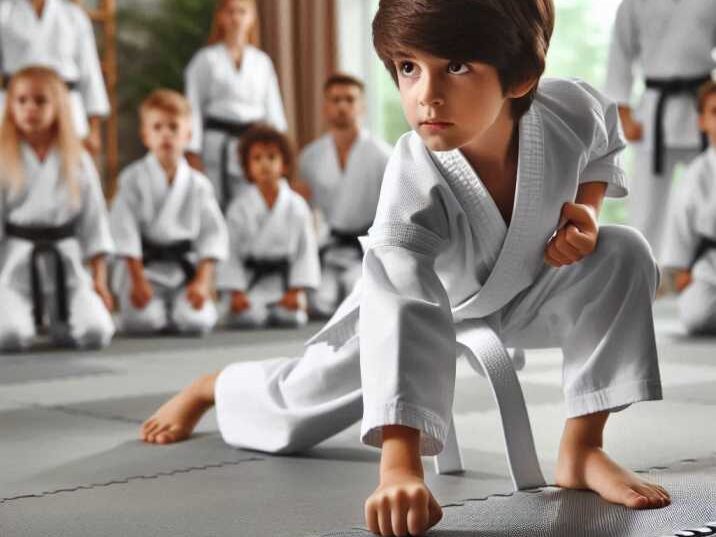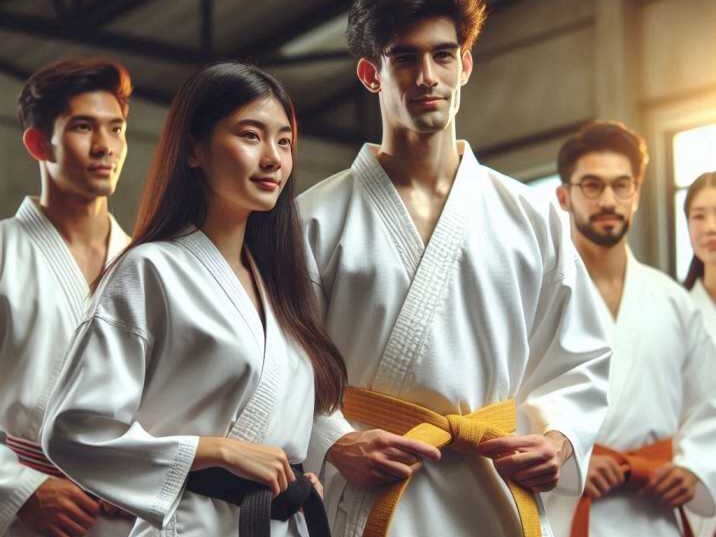Does Martial Arts Build Confidence?
Martial arts is more than just learning how to punch, kick, or defend oneself. It’s a powerful tool that can help build confidence, especially in young people. But how exactly does martial arts training lead to improved self-esteem? In this article, we’ll explore the ways how martial arts builds confidence and why it’s a valuable activity for children.

Introduction to Martial Arts
Table of Contents
Martial arts is a form of physical exercise that includes various fighting techniques, such as karate, judo, taekwondo, and Brazilian jiu-jitsu. While these practices focus on self-defense, they also emphasize the importance of respect, discipline, and self-control. These core values make martial arts an excellent activity for kids and adults alike.
How Does Martial Arts Build Confidence?
Martial arts can play a significant role in shaping a child’s personality. The training sessions are designed to challenge the body and mind, helping students build a sense of self-worth. Let’s dive deeper into the reasons why martial arts is effective in boosting confidence.
1. Developing Discipline and Focus
Martial arts training emphasizes discipline and focus, which are crucial for mastering techniques and progressing in the practice. Each movement in martial arts, whether it’s a punch, kick, or block, requires precision and concentration. Instructors often remind students to pay close attention to their form, breathing, and the sequence of movements. This intense focus on detail helps students develop a habit of concentrating deeply on the task at hand.
Over time, this ability to focus doesn’t just stay within the dojo (the place where martial arts is practiced); it extends to other areas of life, such as schoolwork or hobbies. Children who learn to concentrate during martial arts training can find it easier to focus on their studies, listen to teachers, and complete assignments. This improved focus can lead to better academic performance, which in turn boosts their self-confidence.
2. Physical Fitness and Strength
Martial arts is a full-body workout that enhances physical fitness. It improves strength, flexibility, endurance, and coordination. As children practice martial arts, they become physically stronger and more agile. This physical improvement plays a crucial role in building a positive self-image.
When kids feel fit and strong, they often feel more confident in their bodies. They start to take pride in their physical abilities, whether it’s being able to run faster, jump higher, or perform complex martial arts techniques with ease. This sense of physical competence can make them feel more confident in other physical activities as well, such as sports or even everyday tasks like carrying heavy school bags.
3. Learning Self-Defense
One of the most practical benefits of martial arts is learning self-defense. Martial arts teach children how to protect themselves in potentially dangerous situations. This knowledge is empowering because it gives children a sense of control over their own safety.
When kids know that they have the skills to defend themselves if necessary, they often feel more secure and confident. This sense of security is not about encouraging aggression, but rather about building the confidence that comes from knowing they can take care of themselves. This self-assurance can help children navigate social situations more confidently, reducing fear and anxiety in challenging environments.
4. Setting and Achieving Goals
Martial arts is structured around a system of goals, typically represented by colored belts. As students progress, they move from one belt to the next, each representing a higher level of skill and knowledge. Achieving these goals requires dedication, hard work, and persistence.
Every time a student earns a new belt, they experience a sense of accomplishment. This achievement is a powerful confidence booster because it shows students that they can set a goal, work towards it, and succeed. The experience of repeatedly achieving goals in martial arts teaches children the value of persistence and hard work, and it builds their confidence to tackle challenges in other areas of life.
5. Building Social Skills and Teamwork
Martial arts classes often involve working with others, whether it’s practicing techniques with a partner or participating in group drills. These interactions help children develop social skills and learn the importance of teamwork.
In a martial arts setting, students must communicate with their partners, follow instructions, and sometimes lead others. These activities help them learn how to interact respectfully and effectively with their peers. As they build these social skills, they gain confidence in their ability to work with others, make friends, and participate in group activities both inside and outside the dojo.
6. Overcoming Challenges
Martial arts training is designed to be challenging. Students are pushed to step outside their comfort zones, whether it’s by learning a difficult new technique, sparring with a partner, or performing in front of others. These challenges can be tough, but they also provide valuable lessons.
When students overcome these challenges, they develop resilience and mental toughness. They learn that they can handle difficult situations and that failure is just a part of the learning process. This resilience is a critical component of confidence, as it gives children the belief that they can face challenges and succeed, no matter how tough things get.
7. Positive Reinforcement
Martial arts instructors typically use positive reinforcement to encourage students. They praise effort, improvement, and perseverance, rather than just focusing on perfection. This approach helps children understand that success is about progress, not just the end result.
When children receive positive feedback, they feel valued and encouraged. This reinforcement helps them build a growth mindset, where they understand that their abilities can improve with practice. As a result, they become more confident in their potential to succeed, even when they face setbacks.
The Psychological Benefits of Martial Arts
1. Reducing Anxiety
Anxiety is a common issue for many children, and martial arts can be an effective way to manage it. The physical activity involved in martial arts releases endorphins, which are chemicals in the brain that act as natural mood lifters. Additionally, the focus required during martial arts training helps students to clear their minds of worries and stresses, at least temporarily.
As children practice martial arts, they learn to control their breathing and remain calm under pressure, which are techniques that can help reduce anxiety in everyday situations. The more they practice, the more these calming techniques become second nature, leading to a general decrease in anxiety and an increase in confidence.
2. Improving Self-Esteem
Self-esteem is closely tied to confidence, and martial arts can have a significant impact on a child’s self-esteem. As students progress in their training, they can see their improvement firsthand—whether it’s mastering a new technique, moving up in belt rank, or simply becoming more physically fit.
This visible progress helps children develop a positive self-image and believe in their abilities. Each small success in martial arts reinforces the idea that they are capable of achieving their goals, which boosts their overall self-esteem and confidence.
3. Creating a Sense of Community
Martial arts schools often foster a strong sense of community. Students support each other, cheer on their peers during tests, and celebrate each other’s successes. This environment of encouragement and camaraderie helps children feel that they are part of something bigger than themselves.
When children feel accepted and valued by their peers and instructors, they naturally become more confident. They know that they have a supportive community behind them, which can give them the courage to face challenges both in and out of the dojo.
The Role of Martial Arts in Academic Success
The discipline and focus required in martial arts can have a positive impact on a child’s academic performance. Here’s how:
1. Improved Concentration
Martial arts training helps children develop the ability to concentrate for extended periods. This skill is essential in a classroom setting, where focus is required to absorb and retain information.
2. Better Time Management
Martial arts teach students to balance their time between training, school, and other activities. Learning to manage their time effectively is a valuable skill that contributes to academic success.
3. Enhanced Problem-Solving Skills
Martial arts often involve complex techniques that require critical thinking and problem-solving. These cognitive skills are transferable to academic subjects, helping students excel in areas like math and science.

Table of Information: How Martial Arts Builds Confidence
| Factor | How It Builds Confidence |
|---|---|
| Discipline & Focus | Enhances concentration, leading to better performance in school and other activities. |
| Physical Fitness | Improves self-image through strength and endurance training. |
| Self-Defense | Provides the knowledge and skills to protect oneself, increasing feelings of security. |
| Goal Setting | Boosts self-esteem through the achievement of belts and ranks. |
| Social Skills | Builds confidence through teamwork and social interaction. |
| Overcoming Challenges | Encourages resilience and mental toughness by facing and overcoming difficult situations. |
| Positive Reinforcement | Fosters a growth mindset by encouraging effort and perseverance. |
Conclusion
Martial arts is more than just physical training; it’s a journey that martial arts builds confidence in many areas of life. From improving focus and discipline to enhancing social skills and self-esteem, martial arts offer numerous benefits that can help children grow into confident, capable individuals. Encouraging your child to take up martial arts could be one of the best decisions you make for their development.
FAQs
1. Can martial arts help with schoolwork?
Yes, martial arts can improve focus and discipline, which can lead to better performance in school.
2. What age should a child start martial arts?
Children can start martial arts as young as four or five years old, depending on the school and the child’s readiness.
3. How often should kids practice martial arts?
Practicing two to three times a week is ideal for most children to progress and build confidence.
4. Is martial arts good for shy children?
Yes, martial arts can help shy children build social skills and gain confidence through group activities and positive reinforcement.
5. Does martial arts teach respect?
Absolutely, respect for oneself and others is a core principle in all martial arts disciplines.


